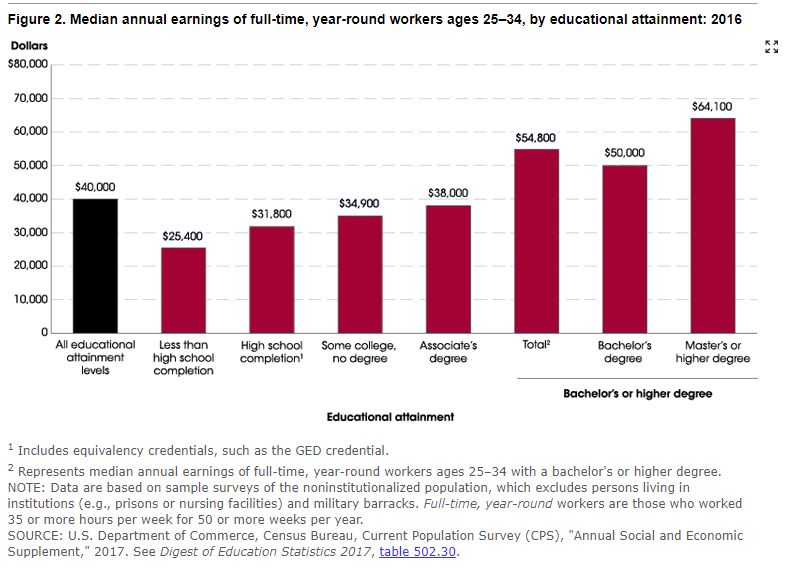No products in the cart.
Posts
ENCORE POST: Are There Any More Good Jobs That Pay Without a Bachelor’s Degree?
ORIGINALLY POSTED FEBRUARY 8, 2018
One of the factors that drives the notion that a Bachelor’s Degree is the surest way to success are familiar charts that show average earnings by degree. For example, one chart shows average earnings of young adults by the degree they have earned, with the average young Associate Degree holder earning about $37,000 and the average BA Degree holder earning $50,000.

But those of us who are established in our careers know that earnings alone do not make a good career decision. In fact, a misinformed college choice may be more of a set-back, rather than a step forward. Earnings matter, of course. But it is essential that we find the best personal fit to the work itself and can successfully enter and complete the requisite education and training program.
In one of its newer reports, “Good Jobs that Pay without a BA,” (see https://goodjobsdata.org/) researchers at the Georgetown Center for Education and Employment discovered there are still about 30 million “good jobs” in the U.S. that don’t require a Bachelor’s Degree. They identified a “good job” as one that paid at least $35,000 a year and an average of $55,000 a year. Out of 123 million workers in the U.S. workforce, there are about 75 million who hold a “good job,” and 30 million of these good jobs can be accessed with some sort of education and training less than a four-year college degree.
While the majority of non-BA “good jobs” exist in so-called blue-collar industries (16 million in manufacturing, transportation, utilities, wholesale and retail trade, constructional and natural resources), there is actually a faster growing number of them in the skilled services sectors (14 million jobs in financial and consulting/business services, health care services, leisure and hospitality and personal services, education services, government services).
Additionally, among the non-BA good jobs, more of them now than ever do require some education and training beyond high school. Since 1992, there has been an increase of 3.2 million “good jobs” that require an Associate’s Degree, and a 940,000 increase in “good jobs” requiring some college-no degree; on the converse, these has been a decline of 1 million “good jobs” requiring just a high school diploma. That means that even if a young person doesn’t see themselves going to a four-year college or university, they need to plan on some sort of further education to get a good job.
Here are three important ideas to share with students as well as moms, dads and school counselors:
- Explore all your post-secondary options within a broad career field. Don’t be timid to pursue a bachelor’s degree education; if you really put in the effort, you can make it. But don’t feel forced into four-year college or embarrassed if you want a career that doesn’t require a BA. There are many good jobs that don’t require a bachelor’s degree.
- Pay attention to trying to find the best career fit. This means paying attention to the work itself — does it interest you and seem important to you? What are the working style needed and work conditions like? How much time and money will it take to get prepared to enter the career field, and what are the job prospects and relocation requirements? Don’t just look at earnings, because research indicates that once you meet basic financial needs, earning more money doesn’t actually increase satisfaction; the other factors matter just as much as rate of pay.
- Don’t be fooled into coasting academically. It is essential that you get a good high school education even if you don’t plan to pursue a four-year degree right after high school. Most of the good jobs today require post-high school education and training, and community college general courses require good academic skills. Most importantly, the good jobs themselves require very good problem solving, written communications and numeracy skills. Further, if you really do well in your chosen field, one day you will probably want to go back for even more college education to advance your career. So, don’t short-sell your future by goofing off now.
Thanks for reading and letting young people know about the Good Jobs!
- You can find all the details in the excellent report from the Georgetown Center for Education and Workforce. “Good Jobs that Pay without a BA.” https://goodjobsdata.org/
- You can also watch a short, informational video that summarizes the report. https://youtu.be/CSzp-9FHe3g
By the way:
In case you’re curious about what “good jobs” we’re really talking about (I was), here’s a sample list of jobs included in the report as Appendix C of the Georgetown U. report.
Blue Collar Good Jobs that Pay without a BA:
Automotive service technicians and mechanics; Carpenters; Computer, automated teller, and office machine repairers; Construction workers; Driver/sales workers and truck drivers; Electricians; Heating and air conditioning mechanics; Heavy vehicle and mobile equipment service technicians and mechanics; Industry machinery operators; Machine operators, assemblers, and fabricators; Maintenance and repair workers, general; Metalworkers and plastic workers; Operating engineers and other construction equipment operators; Pipelayers, plumbers, pipefitters, and steamfitters; Production workers; Radio and telecommunications equipment installers and repairers; and Welding, soldering, and brazing workers.
Skilled Services Good Jobs that Pay without a BA:
Applications and systems software developers; Bailiffs, correctional officers, and jailers; Bookkeeping, accounting, and auditing clerks; Computer and information systems managers; Computer support specialists; Customer service representatives; Diagnostic related technologists and technicians; Engineering technicians; Financial managers; Firefighters; Food service managers; Human resources workers; Industrial production managers; Licensed practical and licensed vocational nurses; Managers; Marketing and sales managers; Nursing, psychiatric, and home health aides; Police officers; Property, real estate, and community association managers; Registered nurses; Sales representatives; Secretaries and administrative assistants; and Security guards.
Hans Meeder is President of NC3T, the National Center for College and Career Transitions (www.nc3t.com). NC3T provides planning, coaching, technical assistance and tools to help community-based leadership teams plan and implement their college-career pathway systems and strengthen employer connections with education


One thing we often forget to add to this equation is the cost of obtaining the college degree(s). What is the return on investment for someone who has devoted years of time and lots of money to obtain a credential? Students need to get the full picture and be aware of alternate routes to obtaining good jobs when the cost to benefit ratios aren’t in sync. Not saying that college can’t be a great thing for many students. But it is not the only option and is often not the best option.